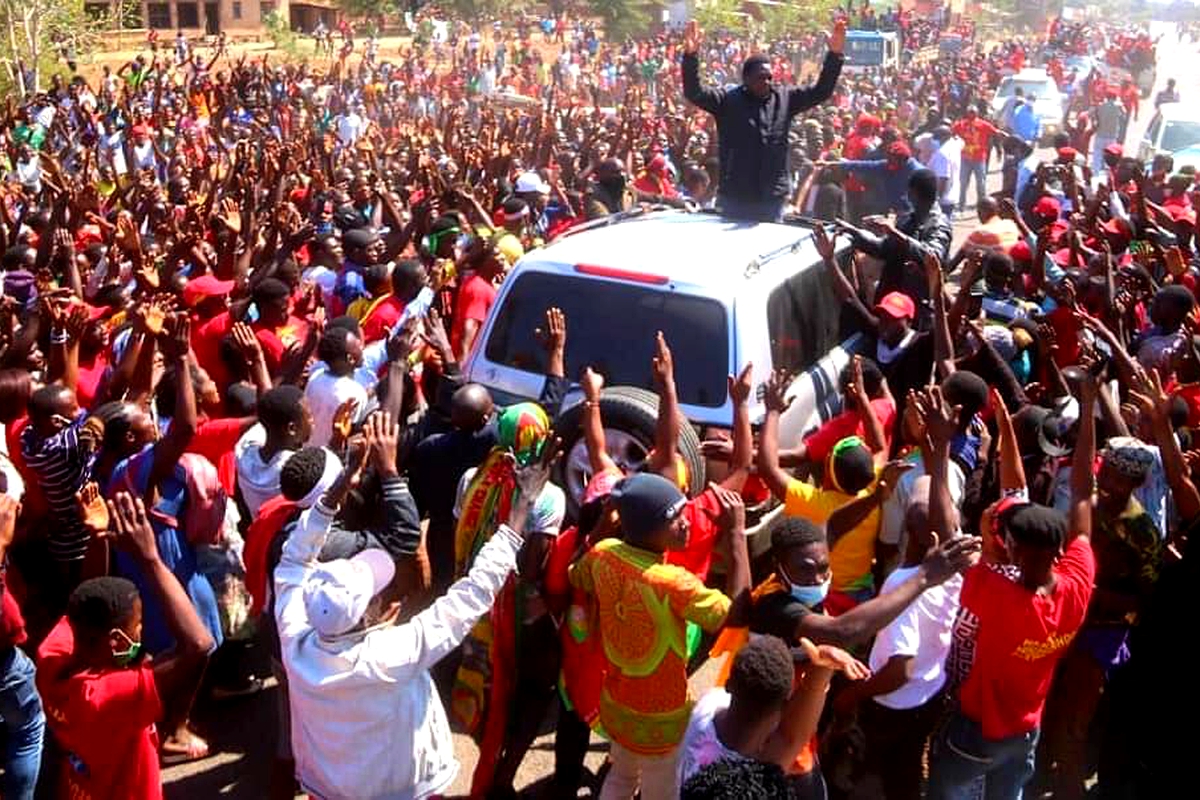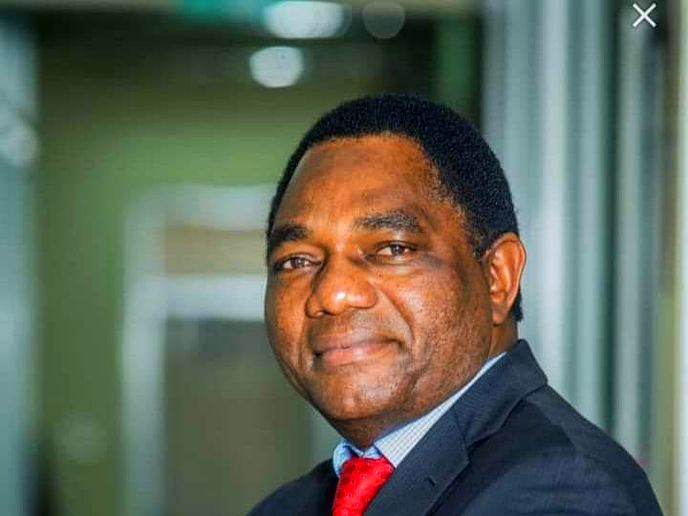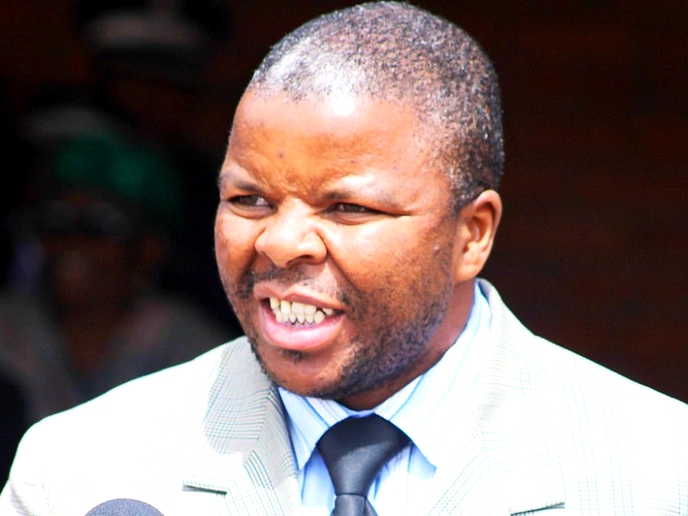Much about the upcoming election is reminiscent of the 2016 race. Will the result be too?
africa
Aug. 10, 2021
NEO SIMUTANYI
4 min read
Zambia’s 2021 elections: unfree, unfair, unpredictable

Main opposition candidate Hakainde Hichilema on the campaign trail ahead of Zambia’s elections on August 12. Credit: UPND.
On August 12 2021, Zambians go to the polls to elect the president, members of parliament, mayors and councillors. This election has been unusual in that it has been characterised by COVID-19 restrictions and bans on physical campaigns in hotly contested areas. However, in many other ways, it has been largely reminiscent of the controversial 2016 general elections.
Once again, the two clear front-runners - from a pack of 16 candidates - are incumbent Edgar Lungu of the ruling Patriotic Front (PF) and Hakainde Hichilema of the opposition United Party for National Development (UPND). And as before, the electoral playing field has largely been skewed in favour of the ruling party as opposition parties have faced a myriad of restrictions, harassment, and intimidation.
Also, like in the last two presidential elections, the results in 2021 are again too close to call. In the 2015 presidential by-election, President Lungu beat Hichilema by just 1.68%. In 2016, he scraped over the line in the first round with 50.35%. Hichilema, who received 47.63%, filed an ultimately unsuccessful petition calling for the election to be nullified, citing irregularities and allegations of fraud.
Much about the 2021 campaign therefore is familiar to Zambians. But will the result be too?
Will it be free and fair?
In an interview with African Arguments this June, Hichilema made it clear he believes he would win if there was a level playing field. “In a free, fair and credible election, [Lungu] has no chance,” he said. “People will be looking at how the economy has collapsed, the job losses, declining health services sector, how difficult it has become to survive and just put food on the table.” He also made it clear, however, that he does not consider this election to be free and fair. Indeed, there are several causes for concern.
The first is the violence perpetrated by ruling party cadres and with the complicity of the police. In the run-up to elections, the media has reported on several instances of violence. Most of these incidents are started by PF activists attacking members of the opposition, especially the UPND. The situation is made worse by police who display bias by failing to apprehend the perpetrators.
Enjoy our daily newsletter from today
Access exclusive newsletters, along with previews of new media releases.
The second is the unfair and selective application of the Public Order Act. This colonial-era legislation was supposed to have been expunged from the statute books. Instead, it is used to restrict opposition activities such as holding of public meetings, rallies, and demonstrations. While the PF has been allowed to campaign continuously since 2016, members of the opposition are subjected to arrests and harassment when they try to meet supporters. Hichilema has been detained 15 times, including from April to August 2017.
The third was the decision by the Electoral Commission to compile a new voter register in a period of just 38 days at the end of 2020. The result of this process is that the number of registered voters in areas considered to be PF strongholds is an estimated 345,000 higher than before, while the size of the electorate in perceived UPND strongholds is 70,000 lower. According to an investigation by News Diggers, there are also 20,000 illegally registered Malawians on the roll who have been bribed to vote for the ruling party. An alleged discrepancy has also been detected between the physical register and the electronic register, whereby 420,000 voters cannot be accounted for. The Electoral Commission has refused demands to conduct an independent audit of the voters’ roll.
The fourth is the introduction of biometric verification to process voters at polling stations with high turnouts. This scheme was hatched late in the electoral cycle and has been widely condemned as it appears to be aimed at reducing numbers of voters especially in areas likely to support the opposition.
Deploying the military
In the final days of the campaign, more reasons for concern have emerged. On July 30, two PF supporters were found hacked to death in Kanyama constituency in Lusaka. In response, President Lungu ordered in the army to help the police maintain law and order. The next day, the Electoral Commission banned the UPND from engaging in campaign activities in Kanyama.
Opposition parties and other groups condemned the deployment of the military as unwarranted. They have raised the fact that Zambia’s military has a record of harassing and intimidating members of the public when called upon to maintain law and order.
Many are also questioning the true motivations for the move. Some suggest that the military may have been drafted in as the police cannot be trusted to apply to law in a fair and unbiased manner. Others believe the army has been mobilised in anticipation of violence in the event of a disputed result, though exactly how the military would respond to widespread popular protests is difficult to predict.
Some ruling party sympathisers have been agitating for the disqualification of the UPND from participating in the Kanyama election altogether and there are rumours one presidential candidate may withdraw from the race, thus causing the postponement of the election. Either of these actions, if carried out will adversely affect the campaign environment and may lead to unrest.
Indeed, there are many unknowns in how the results could unfold and how Zambians might respond. If President Lungu and the PF win convincingly, it is possible that there may not be any serious protests. However, if the results are close and one side disputes them – whether in the first round or after what would be Zambia’s first ever second-round run-off – there may well be unrest and protests that could turn violent. At this point, matters would become even more unpredictable.
African Arguments
Tailored for you




